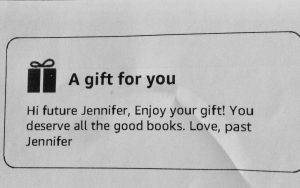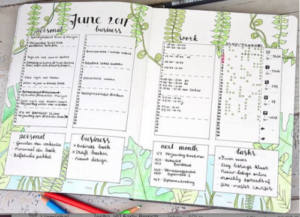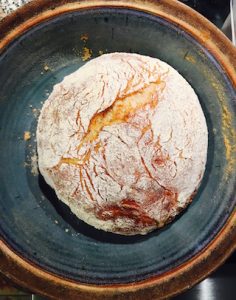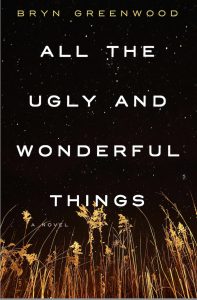Posts by Liz Michalski
A few years ago my family purchased an antique apothecary jar. It’s lovely, tall and delicate with a curving shape, the type of jar once used to store cotton balls or candy. We display it on a high shelf and fill it with beach glass.
There are two beaches near us where locals go to hunt for glass. The first, closest to our house, is the best. It’s rocky and not suitable for sun bathing, but walk there at low tide and you are likely to find fistfuls of sea glass, in colors ranging from brown to green to the coveted and rare blue.
At first, that’s where we went. My husband and I would stroll there after dinner and fill our pockets, or the kids would walk with friends and return to spread their plunder on the table, proudly showing off their haul. And little by little the apothecary jar, which one seemed so enormous, began to fill up. The more glass it contained, the more striking it appeared, the more I couldn’t wait to see what it would look like when it was full.
And then last summer, I was admiring the jar, the way the light played off the colors within and turned them into rich jewels, when it hit me. The layers of glass represented more than just a decoration. They stood for time with my family, for summers that were quickly passing by, for time that wouldn’t come again. Why was I rushing to fill it?
The realization hit just when, due to a myriad of reasons, I was struggling to find happiness in my writing and elsewhere. I was trying to force the outcomes I wanted, slogging through with my head down, sad and missing the beauty around me.
Read MoreInspiration for this column came from this photo, taken by Jennifer Marie Donahue @jmdonahue
Imagine this. You’re sitting at your desk, toiling away on your latest manuscript. It’s been a frustrating few hours (or days, or weeks, or years) and the words aren’t coming together the way you’d like. You decide to take a break just as the doorbell rings. It’s the mail carrier with a registered letter for you! You accept it, and then stare.
The letter is addressed to you in your own handwriting, with the title “writer” in big bold letters before your name. And the postmark is from five years in the future.
You tear the envelope open with trembling hands. What advice is your future self sending you? Is it the name of the agent or publisher certain to accept your work? The plot for a best-seller? A slice of your future royalties?
None of the above. Yet the words are still important — perhaps the most important you can send yourself.
What does the letter say?
Read MoreIt’s summer where I am, and the days are hot and heavy. Condensation beads the sides of my glass of ice tea. The dog rests motionless in front of the fan and the lines of my WIP, which should be marching across the computer screen like ants across hot pavement, are still.
It’s summer. The season of unlimited time and no time at all.
I forget this every year. September to June I’m mired by the school calendar, my days shaped by carpools and sporting events, by ballet classes and dance recitals, physicals and eye exams and parent teacher conferences and threaded beneath it all my own writing assignments. The days pass in a blur of one hour increments stitched together on my phone’s calendar, goals scribbled in my bullet journal at the beginning of year and the month adding meaning and shape. I block time for my novel the same way I schedule vet appointments, dutifully and at regular intervals.
But in summer, time unspools like a ribbon. The car sits in the driveway. The computer stays in its case. I tell myself there will be plenty of time for writing after the beach, after ice cream, after one last late night of playing cards with old friends and swimming in my parents’ pool and walking out at midnight to see the stars. Tomorrow I’ll rise early and get those last 100 pages done. I have plenty of time.
And then it’s four days before August, three weeks before the start of school madness again and I’ve accomplished absolutely no writing. I feel guilty and lazy and worthless. But I’m still staying up late watching movies and playing cards, I’m still going to the beach and pool instead of sitting in front of my computer, I’m still sleeping in and going on ice cream runs.
Herman, our unofficial beach mascot, lolling around.
So if you are like me, how to get back on the writing wagon? More importantly, how to WANT to get back on that wagon again?
Here are a few tricks I’ve found that help:
Read MoreI’m a writer. I’ve been a writer since I first held a pencil and figured out how to spell, both somewhere around the first grade. (I was a late bloomer.) Writing is as integral to my identity as my name or my face.
Yet somehow this past year, I found myself not writing.
Sure, I was talking about writing. I was reading about the craft of writing. I was thinking about writing all the time. But the words were not making it to the paper.
To be fair, other important activities were being neglected as well. Things like exercise, time in nature, walking the dog (unforgivable, I know!). Things like fun. But who has time for fun these days? Between parenting teenagers, eking out a career as a freelancer, running a household, carpooling, and engaging with my spouse, my days — like everyone else’s — are full. Add in the distraction of social media and time slips away faster than the bubbles in the bath I keep neglecting to take.
So this January, I decided to be more mindful of how I wanted to spend my time. I’d been reading about bullet journals (there’s a great — if slightly salty — explanation of what they are here, and our own Barbara O’Neal talks about her take on them here.) In short, bullet journals are a combination daily planner, journal, to-do list, and goal-setting guide, personalized for your individual situation.
I’m not artistic, so I kept mine simple. No beautiful pencil sketches or intricately decorated text, just a yearly calendar where I list big-ticket items that are happening, a monthly calendar so I can see the overall picture for that month, and a daily calendar that lets me list to-dos. (Although I’ll admit, now that I’m three months in, I’ve started jazzing up the pages with cutouts from magazines and inspirational sayings that catch my fancy. It’s a slippery slope.)
These pages serve as a kind of “brain dump” for me, so I can put down some of the tasks that are floating around in my head taking up valuable space. I’ve found that even though I have duplicate lists/calendars on my phone and computer, there’s something soothing about seeing everything written out in black and white.
I also created a habit-tracker — a simple monthly grid that lists the habits I want to create. Each day that I perform one of those habits, I simply fill in a colored bubble for that date. By the end of the month, I can tell at a glance that I’ve walked the dog 10 times, exercised 11, and meditated not at all. (Life — it’s a work in progress.)
Read MoreTalk of collaboration is in the air lately. At Writer Unboxed, we’re not only great at supporting our fellow writers, we’re good at working with them too! Author Heather Webb’s recent post on the positives and pitfalls of collaboration immediately made me think of another WUer — our own Jan O’Hara.
Jan, a former family physician who hails from Canada, has turned collaboration into a fine art. Her first book was one in a series of interconnected novels that shared a physical world and even some characters. Her second book was part of a box set that shared a genre and a theme, as is her third book, due out in February. To me, it seems as if she’s found the perfect balance between writing alone and collaborating — she has a built-in set of writing pals, brainstorming buddies, and marketing allies, but she gets to do the actual writing herself.
I was curious what I could learn from Jan’s experiences and I thought other WUers considering collaboration might be curious about the nitty-gritty as well, so I convinced her to sit down for a long-distance chat. (If you’ve met Jan IRL, you know that wasn’t an easy task. A confirmed introvert, she’s reluctant to talk about herself. ) Here are the results.
Q: Hey Jan! Tell us about your first book — The Opposite of Frozen.
JOH: OoF is the second of twelve romances set in the Thurston Hotel in the fictitious town of Harmony, Alberta. Though the series’ novels can be read as standalones, they are also connected through secondary characters, some of whom have series-long character arcs. The premise: when their tour bus is stranded for a week in a Canadian mountain town, an injured athlete reconnects to life with the help of an attractive stowaway and 51 matchmaking retirees.
Q: How did you wind up finding a group of authors to collaborate with? How closely did you work with them? What were some of the benefits of writing your first book this way?
JOH: I knew I needed to change what I was doing with my writing. I was leaning toward self-publishing but had yet to complete a full novel, much less put it out for consumption. I was intimidated by the technical challenges on top of the writing challenges and couldn’t quite figure out how to move forward or where to begin.
Read MoreSometimes in life everything goes your way.
And sometimes in life, you need to blow stuff up.
I’m speaking metaphorically, of course. (Ignore the boxes of fireworks stockpiled in the corner for the Fourth of July.) Please don’t go buy explosives. Instead, think about what dramatic change in your writing life — in your writing relationships — would look like. And keep in mind that even metaphorical explosions can change your course.
As a writer, I’m always looking for ways to be better. Better at my craft, better at promoting myself, better at finding just the right niche for my manuscript. But sometimes no matter how hard I work — no matter how many writing workshops I attend, how many books on writing I read, how many readers I connect with — I don’t get the results I want.
In addition, my desire as a writer to improve often comes in conflict with my desire as a person not to rock the boat. To be quiet, to be grateful, to be happy with whatever fate hands me. To remember how lucky I am to be a writer at all, even if it isn’t always on my terms.
When faced with a situation like above, where something — your manuscript, your effort, your professional relationship — isn’t working, I’ve come to believe there are two choices.
We can keep trying. Sometimes that is the right option.
Or,
We can recognize that the desire to be comfortable, to avoid change, to keep the status quo, is holding us back. Like the quote says:
“The definition of insanity is doing the same exact thing and expecting different results.”
For example, have you ever found yourself
If you aren’t getting the results you want, maybe it’s time for a change. Time to make it impossible for yourself to keep on the same path, to keep being comfortable. Because being comfortable? It’s nice, but it doesn’t always get you the results you want. Sometimes you need to blow it up.
Read MoreIt’s been a hard year, writing-wise.
A book I love isn’t being loved back by anyone in publishing at the moment. This book took more of my time and of my soul to finish than I’d like to admit, but in the publishing world, that’s never a guarantee of success.
Another book that I’m revising has gotten ideas from witnessing the first book’s failure. This second book stomps its feet and sticks out its tongue as if it’s a sullen child. “I won’t! I won’t do what you say!” it tells me every time I try to prod it into shape. “Why should I?”
Why indeed?
Add to the pile the dark clouds and political uncertainty looming over my country, and it’s very hard to rustle up my writing mojo. But if writing is optional, if no one is waiting for a story, does that story exist? And even if it does, is it worth telling?
I don’t know the answer to that at the moment, despite the fiercely insistent voice inside my head that demands I take the question back, that says that story is all that really matters, no matter what form it takes. This blog post is story. The narrative my children share when I pick them up in the car is story. The evening news, the morning headlines, the history books being written — all story.
What I do know is that my brain is tired. It does not want to make the story, or fix the story, or somedays even be a part of the story. It wants rest and cuddles and time in bed and hot tea. On weekends and holidays it wants champagne and maybe a chance to go ice skating before anyone notices it has snuck out of the house. It does not want to write.
Read MoreWhen it comes to fiction writing, I am the original Poky Little Puppy. I tend to spend a long time thinking about my stories before I write them, scribbling a key line here, a paragraph there, then erasing them when they aren’t perfect and starting again.
In other words, I take too damn long to finish the book.
Some of my pokiness could originally be attributed to lifestyle: When I wrote my first book, I was a new mom and had little kids. I could barely carve out 15 seconds, let alone 15 minutes to write. So I’d jot down a few sentences here and there and see what stuck.
Some of it was rebellion: As a freelance writer, I’m used to working with an outline and on deadline. Fiction, I’d decided, should be fun — and fun meant freewheeling the whole way.
Still, the time had come for a change. The ‘babies’ who took so much time when I started writing are now taller than me and require much less attention that I’d like to admit. And laboring over the same book for years was becoming less fun and more like … work.
But how to morph from Poky Little Puppy to Speed Racer? I had no idea where to begin. Until … drumroll please … the last UnCon, where two separate workshops collided in my head. Much like the candy commercials of old, the two ingredients combined to make something even better — a way to speed up my writing and improve the quality of my first draft.
What were these miraculous sessions? The first was a one-on-one with author and writing coach extraordinaire Cathy Yardley. I’d heard other WU peeps sing her praises before — most notably our own Vaughn Roycroft — but I had no idea what Cathy actually does. At the conference, her assistant passed the word around that Cathy would be holding a few free plot sessions if anyone was interested. I’d never done one, had no idea what one was, but in keeping with my philosophy of trying whatever fate threw my way at the UnCon, I signed up.
A plot session, it turns out, is where Cathy patiently pulls your incoherent story idea out of you, word by word, like a magician pulling scarves out of a hat. Only at the end of the session, you have something like a perfectly folded origami version of the Sistine Chapel, neatly tied up in red ribbon, with a legible roadmap on how to get to the real landmark, and possibly snacks as well.
Okay, maybe not quite like that, but that’s how it felt. I told Cathy my idea and she repeated it back to me, only in actual English words that made sense. She asked leading questions that led to a plot point, and then another, and somehow, from there to a climax and resolution.
Readers, I wrote these things down and wound up with something akin to a unicorn for a pantser such as myself […]
Read MoreA few months ago I was making polite conversation, as one does, with a parent at a sporting event where our children were attempting to thrash each other, as they do. It was cold and rainy and once we’d exhausted the topic of the weather, there wasn’t much to say. Politics? We didn’t know each other, so best not to go there. Sports? Awkward, given the game in front of us. So I turned to my personal failsafe — reading.
“I don’t have time to read,” my new potential friend said. And then saw the look on my face.
“Books! I don’t have time read many books! But I do read a lot —mostly periodicals,” she quickly clarified.
I could work with this.
Later, after the game (we lost, if you were curious. I can’t reveal by how much), I thought about how I rarely include all my non-book reading when the topic turns to, well, what I’ve been reading lately. As writers, I know we all jam on books, but there’s plenty of other stuff out there. And since you never know where your next idea will come from, or how two or three bits of information may combine and spark a plot, I thought I’d share some of my sources. A few are obvious, a few you may never have heard of, but I find them all interesting and I hope you will too.
Newspapers/Magazines
Almost every day I check the front page of several major, reputable newspapers online. I subscribe to The Washington Post (they ran a free six months special a while back for Amazon Prime members — it may be worth checking out), The New York Times, and The Boston Globe. I also scan the BBC and sometimes The Guardian, as well as my local town newspaper. (And ok, I’lll admit it — I have a thing for the Daily Mail. Shush.) It takes me about 15 minutes, and at the end I feel like an informed citizen. Plus, I often find the headlines spark story or plot ideas.
Read More“I didn’t know what I was writing about until I’d finished the book.”
Have you ever heard an author say that? Have you ever said it yourself?
It’s happened to me more times than I can count. As authors, we can be blind to the themes in our own work. I have a theory — often, what we’re writing about is influenced by what our subconscious is secretly grappling with. If we can recognize those issues and themes, we can use them to deepen and strengthen our writing.
First, let’s look at why we may not recognize these emotions and themes. In my experience, writers are often not self-aware. Oh, we’re great at identifying feelings like panic and self-doubt, but we’re not always completely cognizant of how events impact us physically and emotionally. Here’s another theory — as writers, we’ve trained ourselves (or have been born with the temperament) to turn our attention outside, not in. We worry about what other people think, what other people are doing or saying or feeling, and not about what we think or feel. This creates a disconnect between what our emotions actually are, and what we think we’re feeling. We insist we’re happy and relaxed, for example, even when friends or family point out that our hands are clenched or we’re scowling.
So what do we do with all those churning thoughts and emotions we don’t acknowledge? We push them into the bottom of our busy brain’s caldron, where they bubble and combine and eventually threaten to spill over. Now, this disconnect isn’t limited to writers — emotions are tricky territory for many people. BUT — writers, unlike their normal counterparts, have a way to work through what’s bothering us, often without being aware that we’re bothered. And it’s these unacknowledged emotions or issues that help to shape our story and give it cohesiveness. It’s the wound under the bandage of words that the reader senses but never sees, and if it’s done right, it leaves a mark.
Read MoreI really made this!
I lost my Guardian Angel of Bread this month. That wasn’t his name, of course. Jimmy, an old-school Italian gentleman, was (it still seems strange to write that) the father of one of my best friends. I met Jimmy when I was in my twenties, a newly minted adult trying to figure life out. By becoming friends with his son and his wife, I was immediately swept into a wider circle that celebrated all of the most important things — good conversation, good wine, and good food.
Jimmy was a great cook. But it’s his bread I remember the most. On one of my first visits, he pulled four perfect, heavenly-scented golden loaves out of the oven. At that stage of my life, I was still a Wonder Bread girl.
“You baked that?” I asked in awe. In reply, he handed me a loaf and a stick of butter. Both disappeared quickly.
After that, I made sure to come around regularly. There was almost always an extra loaf just waiting for me. But Jimmy was a man who prized self-reliance. After a few months of this, he cut me off.
“It’s time for you to learn,” he said. I ignored him and hoped he’d forget. He didn’t. At last, breadless for several months, I reluctantly agreed, and that’s how I found myself spending a whole Saturday on a crash bread-making course. We started at the beginning, measuring water and yeast, letting it proof, mixing in the flour and salt. Jimmy eschewed recipes, which made following along difficult. He also wasn’t a fan of using a mixer, claiming that bread was all about the “touch.” Easy for him to say — he’d worked construction for years, and had the strength and stamina of someone much younger.
I, on the other hand, was quickly exhausted. Kneading was not my thing. He’d given me my own ball of dough to work with, and looking at its diminutive size and raggedy shape, he shook his head.
I first met Bryn Greenwood in an online writing group a few years ago, and I was immediately struck by how clear and authentic her voice was. She doesn’t equivocate in her conversations or her writing. Her pull-no-punches style may sometimes be uncomfortable, but it’s always interesting.
Bryn, who bills herself as a “fourth-generation Kansan and the daughter of a mostly reformed drug dealer,” has an MA in creative writing and two small press novels, but it is her latest work, All the Ugly and Wonderful Things (St. Martin’s Press) that’s garnering talk. The Associated Press says that “This book won’t pull at heartstrings but instead yank out the entire organ and shake it about before lodging it back in an unfamiliar position.” Library Journal calls it “…so freakishly good and dangerous that it should come with a warning label.”
Intrigued? Then read on to get Bryn’s take on the road to publishing, what makes a character compelling, and whether it’s true that any publicity is good publicity. (And as a bonus, meet her big brown dogs!)
LM: True confession time — I have a big brown dog I call the Slobbering Beast, and my main goal in interviewing you was to get you to talk more about your own beasts. You have two, correct? Are they as much trouble as mine?
BG: I have two boxers, who are the most wonderful, pain-in-the-ass thing that ever happened to me. They were the dog equivalent of an unplanned pregnancy. I dated this guy and in the process of our very messy relationship, he left his dogs at my house. That was six years ago and now they’re my dogs. The one is a pretty pretty princess who lives to be petted and admired. The other is truly a slobbering beast, who hates all but about three people in the world. Her head is approximately the size of a car battery and she becomes unhinged when she has to confront anything with wheels on it. They really are the nicest thing in my life on any given day.
LM: Always nice to have the dogs to lean on during the publishing process, isn’t it? Speaking of which, your path to publication has been a twisted one. You’ve had fiction and essays appear in places like The New York Times and the Kansas Quarterly, you have an MA, and you have two previous novels published with indie publishers. On the surface, it sounds idyllic. Yet getting to this place where you are now — with a well-received book coming out from a mainstream publisher — has been a struggle. Would you talk a bit about that, and what kept you going?
BG: My experience is a reminder that the path to publishing is not linear. In 2008 I had an agent and a novel that went to several acquisition boards, but was never sold. It was enormously discouraging, but publishing is a Sisyphean chore. I had pushed my boulder to the top of the hill and fallen back to the bottom. After my agent and I parted ways, I […]
Read MoreWriting may be the business of words, but it is also the business of waiting. Whether you are crafting your first manuscript or polishing your third best-seller, there’s some purgatory involved. You wait for your beta readers to get back to you. You wait for an agent to discover your manuscript. You wait for blurbs from other writers. You wait for an editor to decide whether to publish you. You wait to see what changes will be required. You wait, you wait, and then you wait some more.
If you are like me, all this waiting creates some serious anxiety. It’s tempting to moan to my husband, kids, and friends, and I definitely do that at times. It’s also tempting to hang out on the couch, watching reruns of Buffy the Vampire Slayer, binging on chocolate and popcorn and spiraling into a ‘they love it!/they hate it!’ cycle. But the waiting stage can go on for weeks or months, and that’s an awful lot of moaning and popcorn. Here are a few more productive ways I’ve found to spend the time.
Take a break. I’ve written about this before. My writing mind needs a chance to rest and recover, a chance to hum quietly in the background, making connections and discovering new material and ideas without being forced to commit them to paper. That way, when I do return to writing, I have a fresh well from which to draw.
FYI: By taking a break I don’t just mean avoid starting new work. Don’t mess with your current manuscript either. Opening the file, reading a few lines, closing it in elation or horror — “It’s so good! I’m so glad I sent it!” “It’s awful! What was I thinking?” — that way lies madness. You’ve either made it as good as it can be before other eyes see it, or you haven’t. Either way, leave it alone for now.
Read More- « Previous
- 1
- 2
- 3
- Next »






















